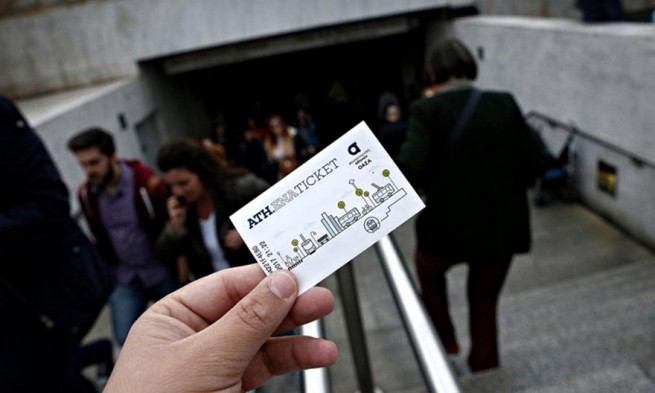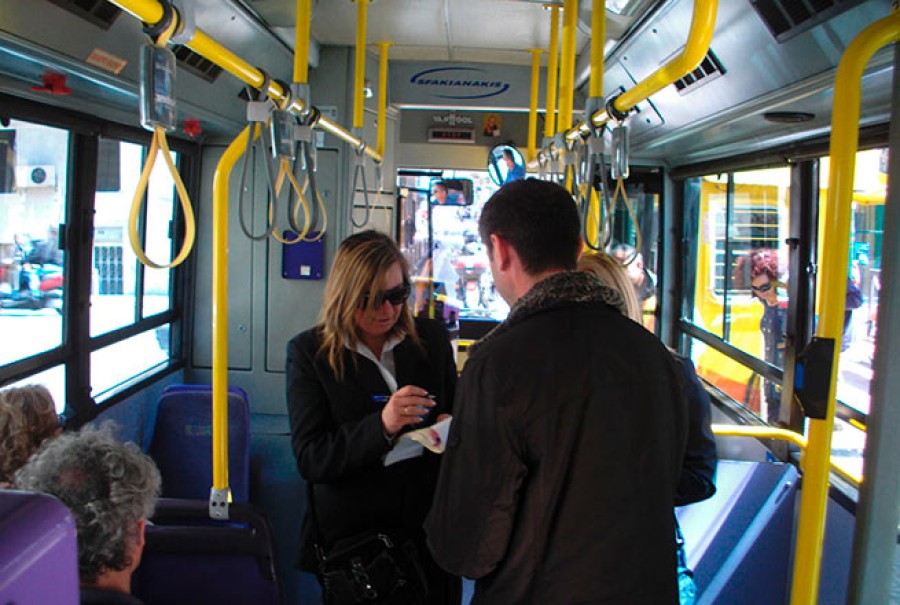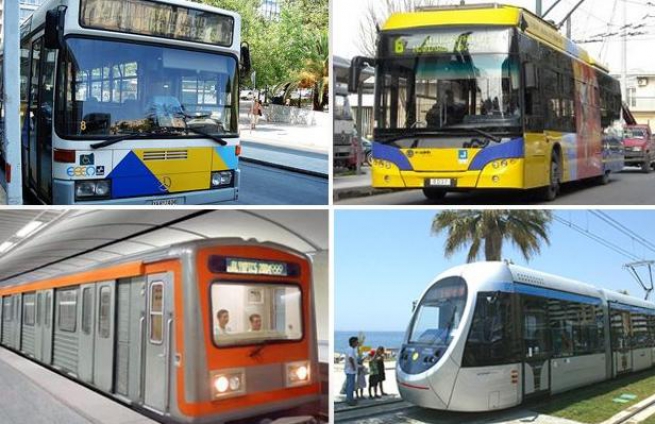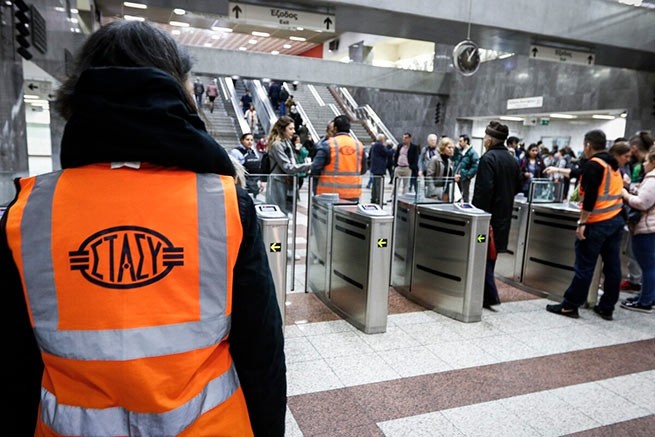How free riders are caught in Athens, how checks are carried out, what the size of fines is, where to pay them, how to pay so that there is a 50% discount, and what will happen if you don’t pay the fine – a small educational program for users of public transport in Athens.
What are the responsibilities of passengers to pay for travel?
According to Law 1214/81, passengers of public transport must pay the legal fare, if applicable, for the route concerned, keep proof of payment (ticket) when issued (validated), throughout the journey and present it when required by the competent controller.
It is prohibited to transfer a validated single ticket from one passenger to another for a fee or free of charge, or to use a ticket already validated by another passenger in accordance with the General Conditions of Carriage, since the transferred ticket is no longer a valid travel document (unless you are caught red-handed, there are no verification methods exists, so at the exit of the turnstile in the metro you can often find still “good” tickets).

Where are tickets checked on public transport in Athens?
Tickets are checked in the cabin of each vehicle. In addition, at metro, HSTAP and commuter stations, screening may be carried out on the platforms and, usually, in the “ticket control” areas, that is, after the cancellation machines.
Who checks tickets on public transport
Checks are carried out by ticket inspectors authorized by the competent authority (OASA, OSI, STASY, TRAINOSE) and equipped with a special token of the official identity card of the controller. Despite the announcements made by OASA about the creation of a single ticket inspection authority, today the majority of inspectors on buses and trolleybuses are drivers who carry out inspections voluntarily, outside of working hours.
Due to numerous cases of misconduct by PSOA drivers/controllers, we recommend paying any fines NOT directly controllers, and in the offices of the relevant departments, while requiring the opportunity to verify the identity of the controller (there have been cases…).
What is the procedure for checking tickets
Before the inspection begins, inspectors will display their official identification card, which contains their details. When introducing themselves, they ask passengers to present their tickets or travel cards. If the inspection is carried out on a bus or trolleybus, inspectors must provide passengers entering at the same stop with sufficient time to validate their tickets. They must then ask the driver to close the ticket machines.
When conducting an inspection, inspectors must ask passengers and check the validity of the ticket presented to them. If the passenger is carrying a monthly or annual card, the ticket inspector checks the validity of the card (whether it contains the owner's details, whether it has a stamp), the authenticity and validity of the voucher that must accompany the card and asks for identification if he believes that the bearer is not legal owner.
He must also check the supporting document presented to him in case the passenger has the right to free or discounted travel (which is what many are “scorching” at – 30% of fines are precisely in this category). If a violation is found during the inspection (for example, if a screened passenger fails to present a valid fare or is found to be using an invalid ticket), the controller is required to issue a certificate confirming the violation and imposing a fine, which includes the controller's registration number, full information about the violator, location and the time of the violation and the amount of the fine due.
What happens if you don't have your ID with you?
If the violating passenger does not have an identity card or other document confirming his identity, or refuses to present it to the controllers, but still wants to pay the fine directly, then an act is usually drawn up confirming the violation and imposing a fine, which indicates the identity information, communicated orally.
If the violating passenger does not want to provide information about his identity, but nevertheless wants to pay the fine directly, then in the act of confirming the violation and imposing a fine, his data is indicated as UNKNOWN (ΑΓΝΩΣΤΑ).
If the violating passenger does not have an ID card or other document confirming his identity and is unable or unwilling to pay the fine directly, then to verify his identity you should seek help from a police officer. In any case, we recommend not paying the fine directly to the inspectors (why? Read here)
What happens if you refuse verification or do not provide your data to the inspectors
Failure to present a valid transport document is an offense and will result in a fine. The violator is obliged, if he does not pay the fine immediately, to present to the official responsible for checking and paying the fine his identity card or other document confirming his identity. In case of refusal, the official exercising control can turn to the police officer for help, which usually happens.
What happens if you refuse to receive an act confirming the violation and imposing a fine?
If the violating passenger, having presented his identification card, refuses to sign the act and receive the copy assigned to him, the controller writes on the act the words “refused to sign and receive this act” and transfers two copies of the act to the competent department of the institution.
Does the inspector have the right to withhold an ID, passport or unlimited travel pass?
Not allowed hold an unlimited travel pass or a discounted travel card upon presentation by the legal owner. Retention is permitted only if the documents in question are used by persons other than those depicted in the photograph or are counterfeit or falsified. In this case, the owner’s exact data is requested, the fact of the violation is confirmed, and an additional note is submitted for further action by the institution.
It is also not allowed to retain the public documents of the violating passenger, such as an identity card, passport, etc. If the passenger’s documents were inadvertently left in the hands of the controller, he is obliged to inform his service about this and transfer these documents there as soon as possible or at the nearest police station.

What is the amount of the fine
The fine is equal to 60 times the cost of the ticket, full or reduced. From September 1, 2014, the fine is 72 euros or 36 euros for beneficiaries. For metro passengers on the Koropi – Airport section, the fine is 20 times the cost of the ticket (10euro*20=200euro). The fine is reduced by 50% if it is paid directly or within 10 days at the competent fine payment offices, i.e. converted to 36 euros or 18 euros.
Where can I pay the fine?
Due to numerous cases of unlawful actions by drivers/inspectors of private security companies, we recommend paying any fines NOT directly to the inspectors, but in the relevant offices of the organization, while requiring confirmation of the identity of the inspector:
When paying fines imposed by auditors ΟΑΣΑ / ΟΣΥ (buses, trolleybuses):
Address: 15 Metsovo (1st floor), Athens, Greece.
Payment hours: Monday – Friday 08:00 – 14:15
Contact phone: 210-8200848, 943, 830
Fines imposed by ΟΣΥ (bus, trolleybus) inspectors at the OASA offices or at one of the two competent offices O.S.E.:
Address: Parnasu street, 6, ag. Ioannis Rentis (behind the village) and Admitou Street 17, Attiki Square (next to Attiki metro station).
Opening hours: weekdays from 07:30 to 14:30.
Contact numbers: 210-4270649, 210 4270705, 210 4270796, 210 4270841.
Regarding fines imposed by STASY inspectors (metro, ΗΣΑΠ, tram), please contact the relevant STASY office:
Address: 67 Athinas Street, Athens (ground floor).
Payment hours: weekdays from 08:00 to 16:00, from 08:00 to 16:00.
Contact phone: 214 4141352, fax: 214 4141383.
Fines imposed by TRAINOSE (suburban railway): at the suburban railway stations specified in the Certificate of Violation and Imposition of Fine.
Is it possible to pay the fine through a bank or post office?
Fines imposed ΟΑΣΑ, you can pay by postal check at the post office. Also, fines imposed by STA.SY. can be paid by bank or post office check. The details are specified in the Certificate of Confirmation of Violation and Imposition of a Fine. If the fine is paid by postal services, the discount does not apply.
Is it possible to get a monthly card on the day of the fine to get rid of it?
Yes! According to decision No. 2997/2014 of the OASA Board of Directors, the fine will be canceled if the passenger, within 60 days, presents to the relevant control services a monthly card issued on or before the same day as the date of the fine. The decision applies to fines imposed by the OASA, OSI and STASY controllers.
Is there a discount if you pay the fine directly?
Due to numerous cases of unlawful actions by PSY drivers/inspectors, we recommend paying any fine NOT directly to the inspectors, but at the offices of the relevant organizations, asking for the identity of the inspector. The cost of the fine is halved if it is paid within 10 days, and there is no reason to pay the inspector directly.
What to do if a fine is imposed unfairly
The passenger should contact the authority that issued the fine directly and complete a complaint form, which will be reviewed by the Fines Complaints Committee.
What to do if you are fined on the day you purchased an unlimited travel pass that you did not have with you
In this case, the passenger must contact the competent fine payment point with confirmation of the offense and the act of imposing the fine, as well as an unlimited travel card. If the card is valid and has the same or earlier issue date than the fine date, the fine will be cancelled.
What to do if you have the right to a discounted travel ticket, but the controller still issues a fine corresponding to the regular ticket price
In this case, the passenger must appear at the competent fine payment office with a document confirming the violation and imposition of the fine, and proof that he is a recipient of the reduced fare, so that the fine can be adjusted accordingly.
What happens if you don't pay the fine?
If the fine is not paid within 20 days from the date of its imposition, a notice of the fine is sent to the appropriate Department of State Finance (Δ.Ο.Υ.) to which the offender belongs, for confirmation. The fine in this case increases 10 times.

You can read about the cost of public transport in Athens in the publication Public transport in Athens and Attica: what, where, how much?







More Stories
Bus route X80 Piraeus-Acropolis-Athens resumes service